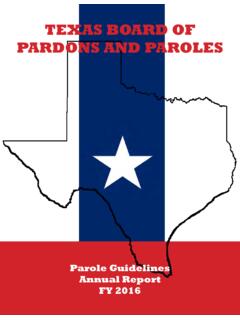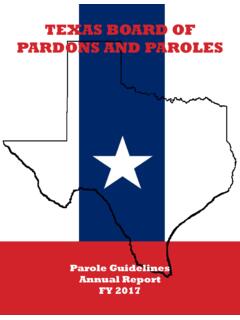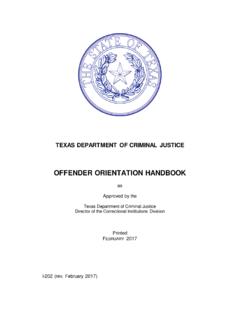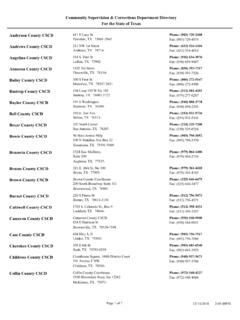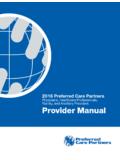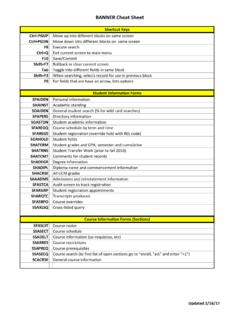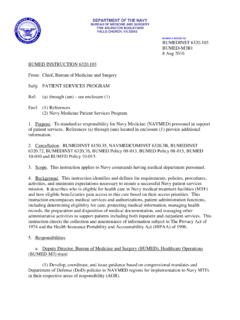Transcription of Policy and Procedures for Community Supervision Admissions
1 texas department of criminal justice Community justice Assistance Division State Contracted Intermediate Sanction Facility Policy and Procedures for Community Supervision Admissions Effective November 1, 2016. Table of Contents Intermediate Sanction Facilities (ISFs) Overview 3. Important Treatment Principles State-Contracted ISFs (SC-ISFs). admission /Placement Policy and Procedure 4. admission Guidelines Facility Procedures 7. Disciplinary, Furlough, Grievance, and Use of Force Procedures Serious or Unusual Incidents Discharge Policies and Procedures 8. Method of Release Aftercare Policies and Procedures 8. Appendix: ISF Packet 10. Attachment A: admission Checklist 11. Attachment B: admission Form 12. Attachment C: Release of Confidential Information 13. Attachment D: Court Orders Granting the Release of Confidential 14. Information (If Applicable). Attachment E: texas Uniform Health Status Update Form 15. Attachment F: Sample Court Order 17. Attachment G: Availability for Pick-up Form 18.
2 SAFPF/ISF Placement Unit Tarik Shakir, SAFPF/ISF Placement Unit Administrator 512-305-9328. Caroline Boyd, SAFPF/ISF Program Specialist 512-305-9365. Bea Ojeda, SAFPF/ISF Administrative Assistant 512-463-7651. 2 of 18. STATE CONTRACTED INTERMEDIATE SANCTION FACILITY (SC-ISF). OVERVIEW. Important Treatment Principles It is important that judges and Community Supervision and Corrections Departments (CSCDs). develop assessment-driven progressive sanctions models that incorporate local treatment resources and state operated and contracted resources. Assessment of an individual's risk to reoffend and his/her criminogenic needs is the most important tool available in determining the most effective course of treatment. The SC-ISF provides an intermediate sanction to revocation that removes the offender from the Community . This intermediate sanction is designed to address Community Supervision violations as well as sanction criminal conduct that can best be addressed by custody that offers cognitive or substance abuse treatment.
3 Evidence-based practices indicate that interventions should be driven by individual assessment, and that the least restrictive intervention be imposed that is probable to achieve the intervention goals. State-Contracted ISF (SC-ISF). The SC-ISF is a secure lockdown facility that completely removes the offender from the Community and provides either substance abuse treatment or cognitive treatment. These programs are targeted toward medium- and high-risk felons. State-Contracted ISF Treatment Tracks Target Population An alternative to incarceration for medium- and high-risk felony probationers in violation of the conditions of Supervision or sanctioned at sentencing based on the nature of the offense or criminal history. Offenders best served, by assessment or offense, in a secure environment due to a history of absconding or treatment nonparticipation. Substance Abuse Treatment Track (Cognitive-based 90 day program). For offenders who have utilized appropriate local treatment options as determined by the CSCD's progressive interventions and sanctions model.
4 Substance Abuse Relapse Track (Cognitive-based 45 day program). For offenders who successfully completed a treatment oriented CCF, SAFPF, ISF or other inpatient treatment program and have relapsed and utilized appropriate local treatment options as determined by the CSCD's progressive interventions and sanctions model. Cognitive Intervention Track (Thinking for a Change 90 day program). For offenders who need both cognitive restructuring and social skills interventions. This facility can be used to provide relapse or progressive interventions to medium- or high-risk felony offenders only. The SC-ISF is targeted for those who have utilized appropriate local treatment options as determined by the CSCD's progressive interventions and sanctions model. 3 of 18. admission /PLACEMENT Policy AND Procedures . admission Guidelines I. Basic Eligibility: In order to be admitted to the SC-ISFs, offender must meet the following requirements: A. The offender must be on Community Supervision for a felony offense.
5 Misdemeanor offenders are not eligible for this program. B. The offender must be eighteen (18) years of age. C. The offender must have a State Identification (SID) number. D. The offender's criminogenic risk must be assessed as medium or high-risk with a validated assessment instrument. E. The offender must be court-ordered by a court of felony jurisdiction to an SC-ISF facility. An offender ordered by the judge to an SC-ISF should be ordered to the appropriate treatment track for no less than 45 days and no more than 120 days (120 days allows for completion of the 90 or 45-day program plus a 30-day extension under specific circumstances). F. A judge may exercise judicial override to protect the safety of the offender and/or Community . G. Application sheet should indicate only one (1) of four (4) treatment tracks: 1. Substance Abuse Treatment Track;. 2. Cognitive Intervention Treatment Track;. 3. Substance Abuse and Cognitive Intervention Treatment Track; or 4. Substance Abuse Relapse Treatment Track.
6 H. For admission into the 90-day Substance Abuse Treatment Track or the 180-day Substance Abuse and Cognitive Intervention Treatment Track, one (1) of the following shall be completed with the offender: 1. a clinical assessment by a qualified credentialed counselor [as defined by texas department of criminal justice - Community justice Assistance Division (TDCJ-CJAD). Standards for CSCDs, (a)(26)]; or 2. an evaluation [as defined by TDCJ-CJAD Standards, Section (a)(18)]; or 3. an assessment by the CSCD's or other entity's qualified credentialed counselor, that was completed within the past 18 months. 4 of 18. I. For admission into the Substance Abuse Relapse Treatment Track, the offender must meet the requirements for admittance into the substance abuse treatment track (above) and must have successfully completed treatment in a Substance Abuse Felony Punishment Facility (SAFPF), SAFPF Relapse Track, or other Therapeutic Community (TC) treatment model, or have previous history of residential treatment; and must have utilized appropriate local treatment options as determined by the CSCD's progressive interventions and sanctions model.
7 J. For admission into the 90-day Cognitive Intervention Treatment Track, one (1) of the following should be completed and submitted: texas Risk Assessment System (TRAS); a clinical interview; or a brief case summary by the Community Supervision Officer (CSO). indicating the need for this program. K. There are no offense exclusions for any of the tracks. II. Physical and Mental Status: Offenders shall be physically and mentally capable of uninterrupted treatment participation. Medical Exclusions: Any offender who has a medical condition that would prevent him/her from participating in and benefiting from treatment is not eligible for placement in a SC-ISF. This includes, but is not limited to, the following conditions: A. Any medical condition requiring permanent infirmary care ( , oxygen-dependence). B. Any medical condition undergoing acute or chronic treatment in which interruption of continuity may jeopardize the patient's final outcome ( , acute fracture care; evaluation of chest pain; staging of a disease process).
8 C. Dialysis. D. Any medical illness, including mental health diagnoses, currently requiring inpatient care. E. Exhibition of a need for alcohol and/or other drug detoxification, or reliance on methadone maintenance. F. A DSM-IV (mental health) diagnosis not stabilized for at least 30 continuous days. Offenders with a DSM-IV (mental health) diagnosis, who have been stable for at least 30 days, including offenders who have been prescribed medication that has been administered for at least 30. continuous days, will be screened individually by the TDCJ-CJAD staff and contractor to determine medical appropriateness. If the psychiatric condition is determined to be of such severity that it would prevent the offender from participating in or benefiting from the SC-ISF. treatment program, the offender will be returned to the referring county. The verification process will entail confirming with the supervising officer that the offender has been incarcerated (note jail entry date on checklist form) for at least 30 days, or the offender has been under supervised mental health care in the Community for the last 30 days.
9 IMPORTANT: To expedite the processing of ISF applications, departments will no longer be notified by telephone of incomplete packets; however, they will be sent a rejection letter via email noting the reason for rejection. Incomplete/Rejected packets will need to be re-submitted for review. 5 of 18. G. Offenders who are pregnant: must be less than 12 weeks pregnant (based on medical record);. must not have a history of abnormal hereditary problems (self-report or medical record); must not have any pregnancies that are/were deemed high-risk (self-report or medical record); must not have a need for alcohol or drug detoxification (screening at facility upon receiving offender);. and may be medically released for any complication determined by facility. H. An offender will be deemed inappropriate for SC-ISF treatment and interventions who has: 1. a severe, unstable acute or chronic illness;. 2. Any medical condition requiring ongoing specialty medical services: The SC-ISF facilities have very limited special needs capability and there may be more appropriate referral sources in the Community for medically fragile or unstable individuals.
10 Medications shall not be designated keep on person (KOP) meds, other than over-the-counter type available at the commissary and health clinic, or urgent care medications such as an inhaler or heart medication. Health clinic visits will be required for all others. III. Legal issues A. The offender's probation discharge date must be greater than the SC-ISF track completion date. B. Legal Exclusions: there are no offense restrictions, but the offender cannot have any pending legal actions that might interfere with treatment. This includes, but is not limited to: 1. a pending Motion to Revoke;. 2. any pending criminal charge(s) or detainers;. 3. immigration holds; or 4. child support detainers. C. Pretrial detainees are not eligible for this program. IV. Assessment Information Assessment or screening must indicate the need for these interventions. Any offender ordered to the SC-ISF who does not meet the admission requirements will be returned to the referring jurisdiction.

